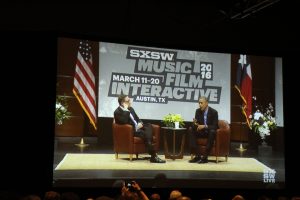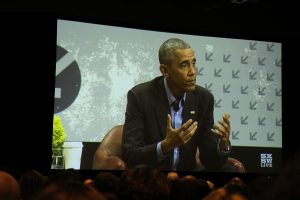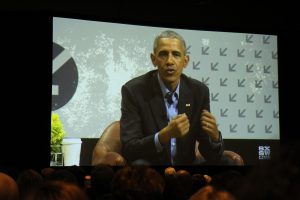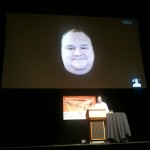In a landmark appearance at the world-leading SXSW Interactive show in Austin, Texas, the US President explained how he’s trying to drag government into the 21st century
One thing you can always rely on at SXSW Interactive is that there will be some must-see keynotes amongst the 1,000-plus talks each year. In 2014, Julian Assange and Ed Snowden both attended virtually from their respective hiding places. This year, it was the opposite end of the spectrum: Barack Obama, the president of the United Status (aka POTUS) himself, made a much-anticipated appearance. SXSW Interactive, and the businesses it caters for, has clearly become centrally important to the US government.
Making government digital and civic engagement were the central themes of the interview by Texas Tribune CEO and editor-in-chief, Evan Smith, in front of a select crowd of SXSW attendees. The lucky few hundred who got to attend were drawn from thousands of applicants by lottery. After a trip to Torchy’s Tacos in Austin, where he ordered “The Democrat”, “The Republican” and “The Independent” (all types of Torchy’s taco), Obama arrived at the interview hall to discuss his vision of how government could be “part of positive change, harnessing big data and analytics to make civic involvement work.”
The key problem cited by interviewer Smith was that the cultures of the tech sector and government couldn’t be more diverse, with the latter big and slow whilst technology entrepreneurship tends to be sleek and fast. Obama sighed at this line of questioning, but admitted that his Affordable Care Act, to help people sign up for healthcare, hadn’t exactly gone as planned when its centrepiece website didn’t work properly. This was, he said, because the procurement and specification systems that were used in government were adapted for the age of buying boots and pencils, not software. These systems were outdated and risk averse.
But this failure led Obama to build a “world class technology office inside government” called the US Digital Service, drawing on industry skills from the likes of Google, whose employees work at the Service for periods to consult and fix systems. Evan Smith explained that the tech people he had talked to wanted flexibility from rules and regulations, or even tax breaks, for working on government projects. But Obama argued that such processes were already in place via the US Digital Service.
 Obama admitted that there was still a lot to do, in particular arguing that the US was “the only advanced democracy in the world that makes it harder for people to vote.” The challenge was how to create safe, secure systems for voting online, and making voters aware of who or what they were voting for. But, he argued, the talent to do this was in the SXSW auditorium. Government needed to be “more responsive where people interact with it”, such as when licensing via the Department of Motor Vehicles or dealing with taxes via the Inland Revenue System.
Obama admitted that there was still a lot to do, in particular arguing that the US was “the only advanced democracy in the world that makes it harder for people to vote.” The challenge was how to create safe, secure systems for voting online, and making voters aware of who or what they were voting for. But, he argued, the talent to do this was in the SXSW auditorium. Government needed to be “more responsive where people interact with it”, such as when licensing via the Department of Motor Vehicles or dealing with taxes via the Inland Revenue System.
However, this wasn’t just a matter of making government digital, but ensuring that people have universal access to the digital space in the first place. Obama argued that the first step he had made was getting unemployment under 5 per cent (which led him to quote the popular meme, “Thanks, Obama!”) But beyond that, it wasn’t just about putting in broadband, but initiatives like Open eBooks, which makes thousands of popular and award-winning titles available free for children from low-income households.
Obama argued that Government’s bad reputation was in part because it has to focus on the tough areas, where the private sector doesn’t have to bother, such as educating the poorest kids, or protection from a terrorist cell. This segued conveniently into the first question from the floor, and in fact the only one they had time for. Fortunately, it was very topical – the ongoing dispute between Apple and the FBI.
Whilst Obama wouldn’t comment on the specific case (he is, after all, a politician), he did provide a lengthy opinion on the conflict between privacy and security. He argued that US society is based on a constitution and bill of rights with healthy skepticism towards overreaching governmental power. However, we accept the need for warrants to search people’s homes if they are suspected of child pornography offences. Technology is evolving so rapidly that new questions are being asked, but Obama claimed that the Snowden reports vastly overstated the issues of dangers to citizens of NSA spying, even if there were clear excesses.
 Obama conceded that incursions into personal data needed to be targeted at someone who is suspected of being a wrongdoer, and that encryption was a necessity to combat malicious hacking. However, he asked, “if technologically it is possible to make an impenetrable device, where encryption is so strong we can’t get in, how do we apprehend the child pornographer or stop the terrorist plot, or prevent tax evasion? Everyone could be walking around with a Swiss bank account in their pocket.”
Obama conceded that incursions into personal data needed to be targeted at someone who is suspected of being a wrongdoer, and that encryption was a necessity to combat malicious hacking. However, he asked, “if technologically it is possible to make an impenetrable device, where encryption is so strong we can’t get in, how do we apprehend the child pornographer or stop the terrorist plot, or prevent tax evasion? Everyone could be walking around with a Swiss bank account in their pocket.”
Whilst he did seem a little shaky on the specifics of key encryption technology, he did make a persuasive case about how we have accepted small incursions into our freedom for the sake of a safer society, for hundreds of years. He argued that we are making our phones into a fetish item that can’t be touched at any cost. Encryption could be made as strong as possible, but there could be safeguards on who has the key, limiting this to the fewest possible. He cautioned against taking an absolutist position, stating that the issue wasn’t a black-and-white one of strong perfect encryption versus Big Brother. Perhaps his most pragmatic point was that if something really bad did happen and encryption could be blamed, public opinion would lead to legislation being pushed through that was sloppy and rushed. It would be better to introduce something in a more measured way before that eventuality, in partnership with the tech community.
Although this was the one and only question from the floor, when Smith called time Obama decided to take “one more minute” because “I’m the President.” He used these extra 60 seconds to exhort those in the auditorium, and those listening via simulcast all over the SXSW venues, to do their bit to help government embrace digital culture. “If you step up and take the baton, I’m really confident about the future of this country,” he concluded. There certainly is a lot of talent and enthusiasm on show at SXSW Interactive, but how favourable it is to government remains to be seen.
Related Posts








